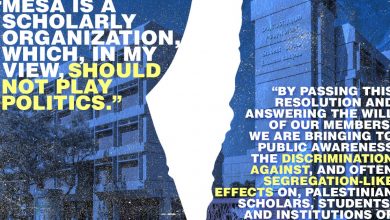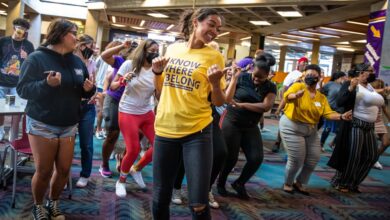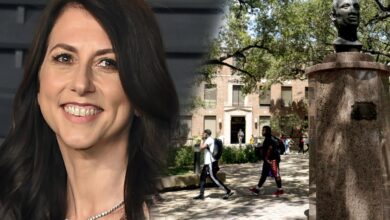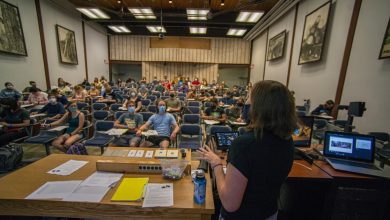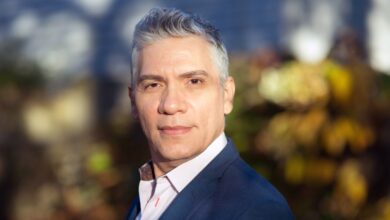Could Political Rhetoric Turn to Campus Violence?

This article is a condensed excerpt from a new special Chronicle report, “Managing Political Tensions: Strategies to Counter Hate, Extremism, and Violence on Campus.”
Experts point to the 2017 “Unite the Right” march in Charlottesville, Va., as a stark warning. They note that colleges and their personnel have long been targets of propaganda and harassment. Given the combustibility of political tempers in recent years, they say, academe would be unwise to shrug off the possibility of something worse. “The pandemic has been awful,” says Robert Futrell, a sociologist at the University of Nevada at Las Vegas who studies extremism. But, he says, because of remote learning, colleges “dodged a really contentious fall through the election cycle.”
The Chronicle interviewed several dozen experts on politics, extremism, hate groups, psychology, media and civic literacy, campus security and policing, and risk management. They predicted that campus political conflict could accelerate amid a worrisomely volatile mix of societal ingredients to which colleges should pay close attention. Among those elements: political polarization, and hostility toward higher education, intellectualism, and societal sectors seen as elite.
For W. Joseph King, president of Lyon College, in Batesville, Ark., ideological clashes are not an abstract concept. Previously, he was senior adviser to the president of Emory & Henry College, in Emory, Va. That college is deep in Appalachia. Lyon is in the foothills of the Ozarks. Both, he says, are “bubbles of inclusion and of diversity surrounded by a sea of angry, disenfranchised populations and a large white-supremacist population. Both colleges have had to deal with active Klan chapters in the area.”
While at Emory, King did a Scripture reading at the marriage of two men. The next night, his wife’s car, parked outside their college-owned house, was firebombed. In case he missed the point, a couple of nights later, the car was firebombed again to destroy the section that the fire department’s quick response had left intact.
When King started his job at Lyon, Donald J. Trump had just won the presidency. King met with students and told them that the Lyon community could have a broad range of political ideas and that students shouldn’t be surprised to encounter challenges to their views. The next morning, he found his front door spray-painted with an expletive directed to “Mr. Prez.”
At Lyon, a Trump rally in the fall of 2020 brought thousands of supporters to the little town of 10,000 residents. The crowd had not just Trump banners but also Confederate flags and neo-Nazi symbols. “Think Capitol mob minus the ‘QAnon Shaman,’” says King. The Lyon campus basically went into lockdown. Keeping the college safe “is a dance of your own safety operations with the local police and the state police.”
In an increasingly polarized nation, says King, who is also a founder of the consulting firm Academic Innovators, colleges can no longer afford to issue milquetoast proclamations and duck difficult political issues. “Presidents are going to have to take hard positions. It’s going to get them on the wrong side of their trustees and donors sometimes, and their political leaders.”
“I look at everything that’s going on today with enormous concern,” says Bruce Hoffman, who has been studying terrorism and insurgency for 46 years and is director of the Center for Jewish Civilization at Georgetown University.
Hoffman and other experts see eerie parallels to the 1920s and the resurgence and expansion of the Ku Klux Klan following that earlier period of pandemic, political upheaval, and economic shock. The Klan began more systematically to target not just Black people but Jews, Catholics, and immigrants. It became a nationwide network, and increasingly established itself not just in rural but in metropolitan areas. And it became less clandestine, pushing itself into the public sphere and gaining adherents among politicians.
Then, and now, Hoffman says, a preponderant theme was the denigration of expertise, science, and the liberal elite. That, he says, makes colleges, like state houses, “targets as citadels of privilege and elitism.” And “when you attack a lot of people in one place, you can get recognition because of shock and horror.”
Colleges “have always been a priority for the far right, especially since the rise of the alt-right,” during the 2010s, says Vegas Tenold, a correspondent and producer at Vice and the author of Everything You Love Will Burn: Inside the Rebirth of White Nationalism in America (Bold Type Books, 2018). Those groups have heavily pamphleteered at colleges, too. Tenold thinks far-right groups will return to campus with new wedge issues about Covid-19 — vaccination mandates, masking, and the like.
When Trump was in office, building “the wall,” pushing back on immigration and against Black Lives Matter, “all of that felt good for the white-supremacist movement,” says Carla Hill, associate director of the Anti-Defamation League’s Center on Extremism. Antigovernment groups, too, were happy with Trump, and directed much of their rage at governors and local leaders trying to enact Covid-control measures. She predicts that President Biden’s efforts to reverse Trump’s policies will inflame the white-supremacist movement in the next few years. “It’s a heated time in our history.”

Harry Campbell for The Chronicle
Socioeconomic and cultural shifts have alienated some people who believed in the idea that they would do better than their parents, but in many cases haven’t. Instead of examining the societal and global trends that have thwarted those dreams, says Stephanie Lake, director of the Criminal Justice Program at Adelphi University, those who feel disenfranchised look for scapegoats — immigrants, ethnic and religious minorities, and people with different sexual orientations and gender identities. Groups on the far right argue that the liberal establishment in the ivory tower has enabled what they see as this new, politically correct culture, and is “canceling” them.
People who feel excluded from wealth and power look for “ostensibly intellectual explanations” in the rhetorical hothouse of the internet, Lake says, and have done so all the more during the pandemic lockdown. It is unsettling to imagine what they’ll do when they emerge.
“It is almost,” she says, “like a perfect storm of alienation, isolation, and information silos.”
“The obvious problem is that a lot of these attacks are done by small cells or lone actors,” says Todd C. Helmus, a senior behavioral scientist at the Rand Corporation and the author of Violent Extremism in America: Interviews With Former Extremists and Their Families on Radicalization and Deradicalization (Rand, 2021).
Terrorism and security experts certainly don’t rule out attacks from international foes. But they see the greater threat, currently, as coming from within the United States.
Such fears were heightened by the steady drumbeat of mass shootings in the spring of 2021, as America began emerging from Covid lockdowns. NPR reported in May that there had been an average of 10 mass shootings in the United States per week since the year began. (It defined a mass shooting as four or more people shot or killed, not including the perpetrator.)
Lone wolves, says Tenold, the journalist and author, “may be acting alone, but they aren’t radicalized alone.” Because of the way far-right extremist groups operate, he says, the lone-perpetrator scenario is almost more likely than group violence.
Burned by post-Charlottesville lawsuits, far-right extremists are careful and savvy in their rhetoric, says Jack McDevitt, a criminologist at Northeastern University who has written two books on hate crimes. The groups will start a meeting saying that they don’t advocate violence and then spend an hour, indirectly, doing just that, hoping that “someone sitting in the room is going to see themselves as a hero and they’re going to go out and commit the violence.” As representatives of the elite, urging limits on access to guns, colleges could well be targets of that violence, McDevitt says.
Criminologists and experts in policing and security urge colleges to take the peril seriously. “Active-shooter incidents are not going to go away,” says John Bernhards, executive director of the International Association of Campus Law Enforcement Administrators. He urges college leaders to include those scenarios along with other interagency tabletop-planning exercises for violence, natural disasters, and other emergencies.
W.M. (Marty) Kotis III, a businessman in Greensboro, N.C., and member of the University of North Carolina system’s Board of Governors, fears that the 2022 midterm elections will add fuel to the partisan flames. There are “underlying elements that want to use spectacle or groups to draw media attention to their cause,” he says, “and that could be anyone on the far right or the far left doing that.” Kotis is a “big believer in free speech,” he says — until it heats up into something else. “That’s the tipping point for me — when something goes from speech to violence.”
“It seems,” he says, “like we’ve lost the ability to have reasoned discussions with each other.”
Source link


